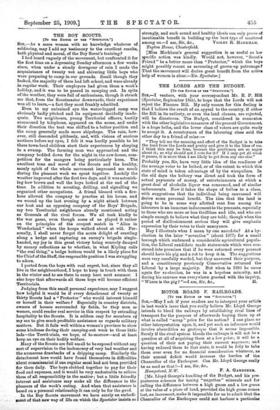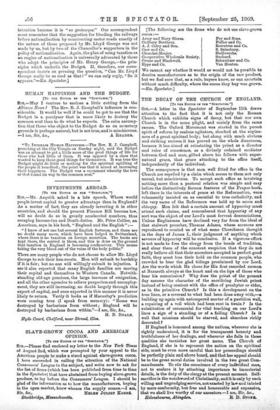MOTOR ROADS V. RAILROADS.
[To TEE EDITOR OP TIER " SFECTATOR."1 Sin,—May I ask if your readers are to interpret your article in last week's issue that you really believe Mr. Lloyd George intends to bleed the railways by establishing rival lines of transport for the purpose of afterwards buying them up at what is called " scrap " price for the nation? I can place no other interpretation upon it, and yet such an inference would involve absurdities so grotesque that it seems impossible. Surely if the rival system bleeds the railways it will not be a question at all of acquiring them at a low price; it will be a question of their not paying their current expenses ; and having reduced them to that state, it would be folly to take them over even for no financial consideration whatever, as their annual deficit would increase the burden of the Chancellor of the Exchequer. Can Mr. Lloyd George really
be as mad as that am, Sir, &e., Hampstead, N.W. F. A. GARDINER.
[Mr. Lloyd George's handling of the Budget, and his pre- posterous schemes for taxing "ungotten" minerals and for calling the difference between a high guess and a low guess at the value of a piece of land, provided the high guess comes last, an increment, make it impossible for us to admit that the Chancellor of the Exchequer could not harbour a particular intention because it is "so grotesque." Our correspondent must remember that the suggestion for bleeding the railways before nationalisation by constructing motor roads exactly of the nature of those proposed by Mr. Lloyd George was not made by us, but by two of the Chancellor's supporters in the policy of nationalisation. Again, the plan of using taxation as an engine of nationalisation is universally advocated by those who adopt the principles of Mr. Henry George,—the prin- ciples which underlie the Budget. If, therefore, our corre- spondent insists on pressing the question, " Can Mr. Lloyd George really be as mad as that !" we can only reply, " So it appears."—ED. Spectator.]











































 Previous page
Previous page